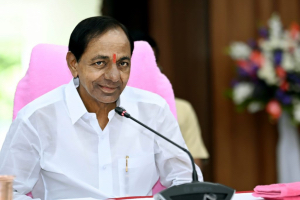
Above: Telangana Chief Minister and TRS chief K Chandrashekhar Rao with the farmer leaders in Hyderabad yesterday
 By G Krishna Mohan Rao*
By G Krishna Mohan Rao*
Hyderabad: The proposed joint forum of farmers at the national level to replicate Telangana’s success in agriculture is likely to be a launchpad for Telangana Rastra Samithi (TRS) chief and Telangana Chief Minister Kalvakuntla Chandrashekhar Rao’s entry into national politics. The two-day discussions he had with leaders of farmers’ organisations from 26 states at Hyderabad —on August 27 and 28 with the participation of 100 farmers—is the beginning of the effort to form a national body, which may later become a national political party with farmers’ issues at the core of its agenda.
The deliberations that the TRS chief had with farmer leaders at his official residence—Pragati Bhavan—indicate that he has finally taken the initiative to unite the farmer organisations from across the country to work on the alternate national agenda. With leaders of farmers’ unions unanimously adopting a resolution urging Rao, popularly known by his initials KCR, to lead a nationwide campaign to unite farmers for struggles, the TRS leader appears set to don a national role. Prominent “Kisan” leaders who attended the two-day session include Bharatiya Kisan Union leader, Balbir Singh Rajewal, and others like Gurnam Singh Charuni, Professor Rakesh Rafeeq and others.
The farmer leaders, who were impressed with the initiative taken by KCR’s government, requested him to lead a nationwide campaign to unite farmers for struggles right from the village level. On the second day of the meeting yesterday, leaders of farmers’ unions urged KCR to prepare the blueprint for the struggles taking into consideration the changed agricultural scenario in the country.

KCR stressed the need for democratic agitations and parliamentary form of struggles along the lines of the agitation for statehood to Telangana, to resolve the problems of agriculture and farmers in the country. Lamenting that farmers did not find solutions to their problems even 75 years after independence, KCR felt the struggles should reach a stage where people who set up obstacles to agriculture would be forced to raise “Jai Kisan” slogans like those who were opposed to separate state joined the “Jai Telangana” chorus.
KCR also underlined the need for linking the farmers’ agitation with legislatures. He recalled that the Telangana movement became stronger after people expressed their demand for a state through the medium of the vote in elections. He suggested to the farmer leaders to enter politics and get elected to statutory bodies to take up issues of agriculture. He also emphasised the need to sensitise people to vote for farmers.
A bitter critic of the Narendra Modi government’s “faulty “ agricultural policies, KCR presided over lengthy discussions on how these policies resulted in the collapse of the farming sector. The farmer leaders agreed that the pro-farmer programmes of Telangana like Rythu Bandhu, Rythu Bheema and free power to agriculture rattled the Centre. They passed a resolution to form a ‘National Farmers United Forum’ to replicate Telangana’s development in agriculture and farmer welfare policies across the country. The meeting analysed the development of agriculture, irrigation and power sectors in Telangana and implementation of farmer welfare programmes and the progress of other agricultural-related projects in the state.
In addition to the initiatives taken to build massive irrigation projects and welfare schemes for the farmers, KCR highlighted Telangana’s success in the rejuvenation of old tanks under ‘Mission Kakatiya’ and drinking water supply to every household under ‘Mission Bhagiratha’. He also spoke on the State’s social security pension, Aasara pensions and other schemes. He told the farmer leaders that as compared to the US, China, or any other country, India was abundant in water, land and human resources. He pointed out that 40 crore acres of cultivable lands in the country needed 40,000 thousand million cubic feet (tmcft) of water, and that 10,000 tmcft of water was enough to fulfil the drinking water needs of the entire population.
KCR said the people in India were suffering due to scarcity of water despite the availability of 70,000 tmcft of water in the country. Though the country had a capacity to generate 4 lakh MW of power, it was not able to go beyond even 2 lakh MW of power, he said. He called for a debate at the national level on how Telangana, a state created only eight years ago, succeeded in ensuring 24-hour round-the-clock electricity supply to all sectors, free and uninterrupted supply to farmers and drinking water to every household. KCR provided the statistics to show how Telangana ramped up its area under cultivation and increased production.
Political analysts say that KCR is now likely to expedite the process of consultation with other stakeholders from across the country to come out with an alternative agenda for the nation. On several occasions, the TRS leader expressed his ambition to play a key role in national politics to bring about ‘qualitative change’ in the country. KCR has also been stressing that his efforts were not aimed at bringing a few political parties together to form a front but he wants to see a qualitative change with an alternative national agenda.
*Senior Journalist





